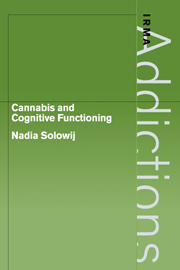Book contents
- Frontmatter
- Contents
- Series editor's preface
- Author's acknowledgements
- 1 Statement of the problem
- PART 1 A REVIEW OF THE LITERATURE
- PART 2 RESEARCH
- 7 An event-related potential study of attentional processes in long-term cannabis users
- 8 An investigation of the effects of frequency and duration of cannabis use
- 9 An investigation of the reversibility of cognitive impairment in ex-cannabis users
- 10 A single case study of cessation of cannabis use
- 11 Anxiety, psychopathology and the qualitative experience of long-term use of cannabis
- 12 Summary, synthesis and conclusions
- Appendix
- References
- Index
12 - Summary, synthesis and conclusions
from PART 2 - RESEARCH
Published online by Cambridge University Press: 16 September 2009
- Frontmatter
- Contents
- Series editor's preface
- Author's acknowledgements
- 1 Statement of the problem
- PART 1 A REVIEW OF THE LITERATURE
- PART 2 RESEARCH
- 7 An event-related potential study of attentional processes in long-term cannabis users
- 8 An investigation of the effects of frequency and duration of cannabis use
- 9 An investigation of the reversibility of cognitive impairment in ex-cannabis users
- 10 A single case study of cessation of cannabis use
- 11 Anxiety, psychopathology and the qualitative experience of long-term use of cannabis
- 12 Summary, synthesis and conclusions
- Appendix
- References
- Index
Summary
This concluding chapter integrates the findings of the original research reported here with the cumulative results of the research reviewed in Chapters 2 to 6. The synthesis of neuropsychological test data and eventrelated potential (ERP) indices of cognitive functioning with the results of other investigations of brain function and structure, enables the formulation of a preliminary model of neuropsychological function in long-term cannabis users. The evidence for long-term use of cannabis leading to subtle cognitive impairments is discussed together with the role of other possible confounds. The nature of the cognitive impairments is discussed in terms of proposed attentional / neuropsychological and neurophysiological / biochemical mechanisms. The implications of these findings for future research is discussed, as are implications for long-term cannabis users.
Summary and synthesis
Is the cognitive functioning of long-term regular cannabis users impaired in comparison to nonusers? What is the nature of this impairment?
Previous reviewers have generally concluded that there is insufficient evidence to conclude that cannabis produces any long-term cognitive deficits (e.g. Wert & Raulin, 1986a, b). This is probably a reasonable conclusion when gross deficits are considered: the weight of evidence suggests that the long-term use of cannabis does not result in any severe or grossly debilitating impairment of cognitive function. Recent reviewers agree, however, that there is now sufficient evidence that the long-term use of cannabis leads to a more subtle and selective impairment of cognitive functioning (Hall et al., 1994; Pope et al., 1995; Block, 1996).
- Type
- Chapter
- Information
- Cannabis and Cognitive Functioning , pp. 227 - 248Publisher: Cambridge University PressPrint publication year: 1998



